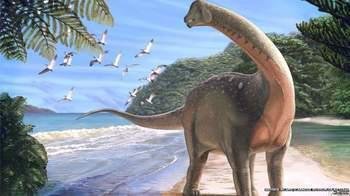A new species of dinosaur found in the Egyptian desert is shedding light on Africa's missing history of dinosaurs. Few fossils have been unearthed from the last days of the dinosaurs, between 100 and 66 million years ago, on the continent. Scientists say the dinosaur, which lived about 80 million years ago, is an "incredible discovery". The giant plant-eater was the length of a school bus and weighed about the same as an elephant.

It had a long neck and bony plates embedded in its skin. The dinosaur's fossilised remains were unearthed during an expedition by palaeontologists from Mansoura University in Egypt. Named Mansourasaurus shahinae, the new species is regarded as a critical discovery for science.
"This was the Holy Grail," he said. "A well-preserved dinosaur from the end of the Age of Dinosaurs in Africa that we palaeontologists had been searching for for a long, long time." Dinosaur fossils in Africa are rare as much of the land is now covered in lush vegetation, rather than the exposed rock that has yielded dinosaur treasure troves elsewhere.
Hi! I am a robot. I just upvoted you! I found similar content that readers might be interested in:
http://www.bbc.co.uk/news/science-environment-42860263